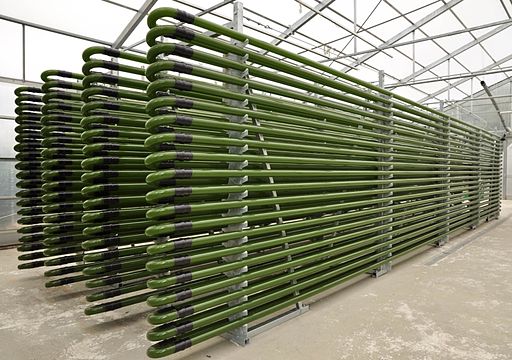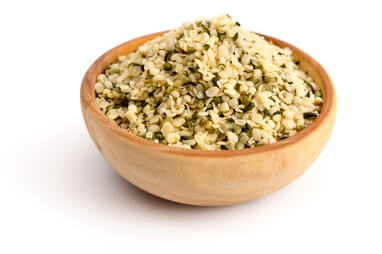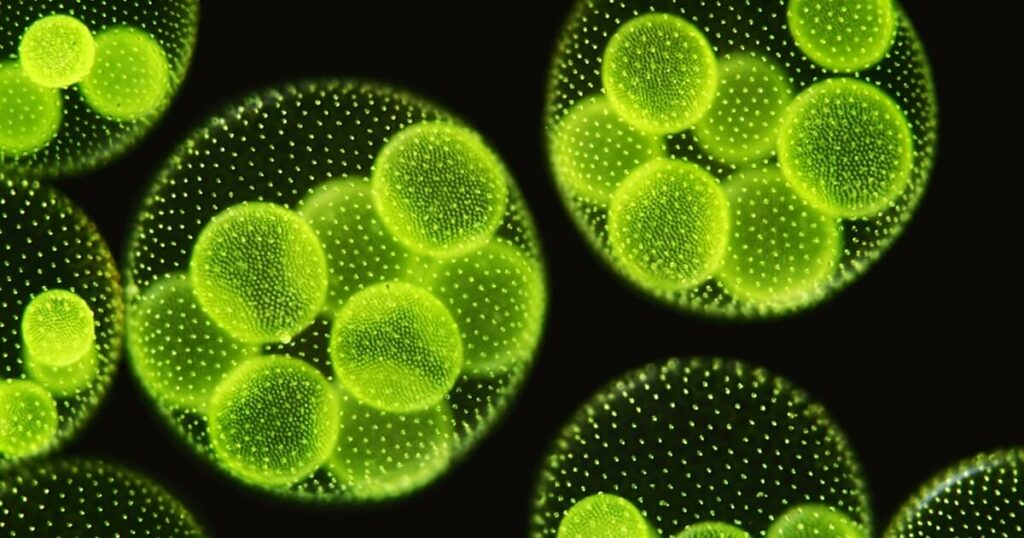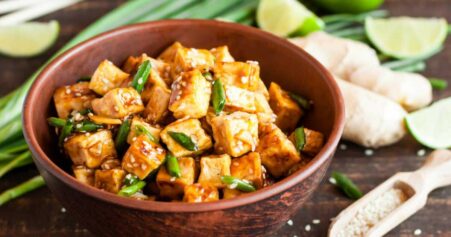Table of Contents
Omega 3 foods in a vegan diet: Which are best?
Some fats or their components, the fatty acids, cannot be synthesized in the human body. Therefore, they are called “essential” and must be ingested through food. These include polyunsaturated omega-6 and omega-3 fatty acids. Especially, the intake of (vegan) omega-3 foods requires special attention. Vegans often consume less of them than people on a mixed diet – provided they eat fish. But: The original source of omega-3 fatty acids is not fish, as many people think. Rather, it is marine algae that supply the animal organism with the essential fatty acids. In this article you will learn if and which algae can be a source of omega-3 fatty acids and therefore can be considered vegan omega 3 foods.
Polyunsaturated Fatty Acids: DHA and EPA
Two types of polyunsaturated fatty acids are considered essential for the human body: the omega-3 fatty acid alpha-linolenic acid (ALA) and the omega-6 fatty acid linoleic acid. Humans cannot synthesize these, but they perform important functions. For example, they are essential components of your cell membranes, are found in the brain and nerve cells, and play an important role in inflammatory processes.
Omega-6 fatty acids are generally not a problem for vegans, as sufficient amounts are found in plant foods. The focus should rather be on foods with a significant content of omega-3 fatty acids, as they are much more scarce in plants. The most important ones are docosahexaenoic acid (DHA) and eicosapentaenoic acid (EPA). Which omega-3 foods are recommended to integrate into a vegan diet?
Sea fish are the most well-known omega-3 foods. Fatty fish contain DHA and EPA. Almost all plant foods contain only the precursor of these omega-3 fatty acids, alpha-linolenic acid (ALA). ALA must be converted in the body to the active forms DHA or EPA, but this process is limited. However, it is not marine animals themselves that produce omega-3 fatty acids, but rather the algae they consume. However, the algae must come from marine regions.
Algae as Vegan Omega-3 Foods in the Diet
In principle, a distinction can be made between macroalgae and microalgae. Macroalgae are “visible to the naked eye” and are an integral part of traditional Japanese cuisine. Examples are nori, wakame and kombu. They are used directly, for example in salads, or in dried form, for example in sushi. What many do not know: Agar-agar, the handy gelling agent, is also derived from macroalgae. Kelp (a brown algae) is often used to make iodine supplements in tablet form.
Microalgae, on the other hand, are microscopic living organisms whose ingredients have a high nutritional value, which is why they are now attracting increasing interest from industry and the general public. They are offered as dietary supplements in powder or tablet form. Probably the best known are chlorella and spirulina.
The nutritional content of algae varies from species to species and from culture to culture. As already mentioned, some of them provide high-quality omega-3 fatty acids. Among these, the species Schizochytrium sp. and Ulkenia sp. are approved for food use and fortification in Europe (European Commission, 2003; EFSA, 2015; European Commission, 2009). Therefore, they can be considered vegan omega-3 foods.
Algae also provide other valuable nutrients such as iodine. However, iodine levels vary widely between species, so frequent consumption of dried macroalgae is not recommended.
Some microalgae also contain vitamin B12. So are there plant foods that vegans can use to meet their vitamin B12 needs? Unfortunately, the answer is not so clear-cut, as both the content and bioavailability vary widely. For this reason, algae cannot be recommended as a reliable source of vitamin B12 at this time.
Microalgae: Production and Sustainability
 Microalgae require sufficient heat and light for proper development, which is why open cultivation systems cannot be used in Central Europe. The main cultivation areas worldwide are in Southeast Asia and the United States. An alternative to open cultivation is the closed tube system, in which the necessary conditions for the organisms are created in the form of glass tubes. The largest production site in Europe is in Germany, where, for example, the microalgae chlorella is cultivated and processed into food supplements.
Microalgae require sufficient heat and light for proper development, which is why open cultivation systems cannot be used in Central Europe. The main cultivation areas worldwide are in Southeast Asia and the United States. An alternative to open cultivation is the closed tube system, in which the necessary conditions for the organisms are created in the form of glass tubes. The largest production site in Europe is in Germany, where, for example, the microalgae chlorella is cultivated and processed into food supplements.
From an ecological point of view, algae can have a positive effect on the climatic crisis in times of industrialization. They can absorb up to three times more carbon dioxide (CO2) than conventional crops. Microalgae in particular have beneficial properties, such as the efficient use of sunlight (Knies, 2017). Marine forms do not require freshwater and can help clean seas polluted by sewage in coastal areas (Singh and Olsen, 2011). Freshwater microalgae have very low water requirements compared to terrestrial plants, while reproducing rapidly. Because of the high productivity and ease of harvesting hardly any pesticides are needed (Knies, 2017). The ecological impact of algae cultivation varies depending on the type of method used.
Fish Oil or Algae Oil?
Fish oil capsules have long been promoted and marketed as the best source of omega-3 fatty acids. Of course, in addition to declining fish stocks, there are environmental, ethical and health concerns related to fish consumption (Root et al., 2013; Mohebi-Nejad and Bikdeli, 2014; Becker, 2015).
Algae Oil: the New Vegan Omega-3 Food?
In the search for vegan omega-3 foods, scientists are now well on their way to finding one. In 2003 and 2009, the European Commission approved the marketing of high-quality oil from marine microalgae. This oil, or rather the extract obtained from it, comes from the species Schizochytrium sp. and Ulkenia sp. This oil is particularly rich in DHA and has been approved as a novel food ingredient for various commercially available products. These include spreads, salad dressings, breakfast cereals, baked goods, and cereal bars (Rexroth, 2015).
Certain processing steps, such as extraction of the fat content, purification with a solvent, and centrifugation to separate unwanted substances, are required to produce the algae oil. The resulting omega-3 algae oil contains the important fatty acids DHA and EPA. The cultivation and complex extraction require some energy and water, which in turn ecologically downgrades the production of isolated oils and preparations (Willers, 2017). Thus, these pure algae oils naturally have their price and are more expensive than fish oil (products) (Knies, 2017). In addition to pure algae oil or algae oil capsules, other vegetable oils with the addition of these DHA- and EPA-rich algae oils are offered.
How Much Omega 3 Do You Need?
There are potential risks associated with overdosing on omega-3 fatty acid supplements. For example, the German Federal Institute for Risk Assessment (BfR) has issued a statement on the maximum levels of omega-3 fatty acids in food, as overdosing may cause adverse health effects. These include an increase in cholesterol levels, an increased tendency to bleed, and a weakening of the immune system in older people. However, negative effects have not been clearly proven (BfR, 2009). In the recommended amounts, omega-3 fatty acids have a number of positive and protective effects on the risk of disease in relation to immune, bleeding and inflammatory functions.
For therapeutic purposes or during certain life stages of vegans, it is recommended to use high-dose supplements. The American Heart Association considers 4 g DHA + EPA per day necessary to reduce the risk of coronary heart disease in the presence of elevated triglycerides (Skulas-Ray et al., 2019).
Omega-3 Foods in a Vegan Diet
 In a vegan diet, essential omega-3 fatty acids are considered a potentially critical nutrient. It is likely that consumption of ALA-rich foods alone (flax oil/seeds, chia seeds, hemp oil/seeds, canola oil, walnut oil/nuts) will not provide an adequate supply of omega-3 fatty acids (specifically DHA and EPA).
In a vegan diet, essential omega-3 fatty acids are considered a potentially critical nutrient. It is likely that consumption of ALA-rich foods alone (flax oil/seeds, chia seeds, hemp oil/seeds, canola oil, walnut oil/nuts) will not provide an adequate supply of omega-3 fatty acids (specifically DHA and EPA).
Microalgae, or oils extracted from them, are good vegan omega-3 foods. They provide the valuable DHA and EPA that are active in the human body. These oils or capsules are a high quality, but expensive form of supplementation. Conventional vegetable oils with the addition of algae oil extracts are another vegan omega-3 food.
The content of this article cannot and should not replace an individual vegan nutrition consultation. In the International Directory for Vegan Nutritionists you will find expert support in your area, locally or online.









Leave a Reply